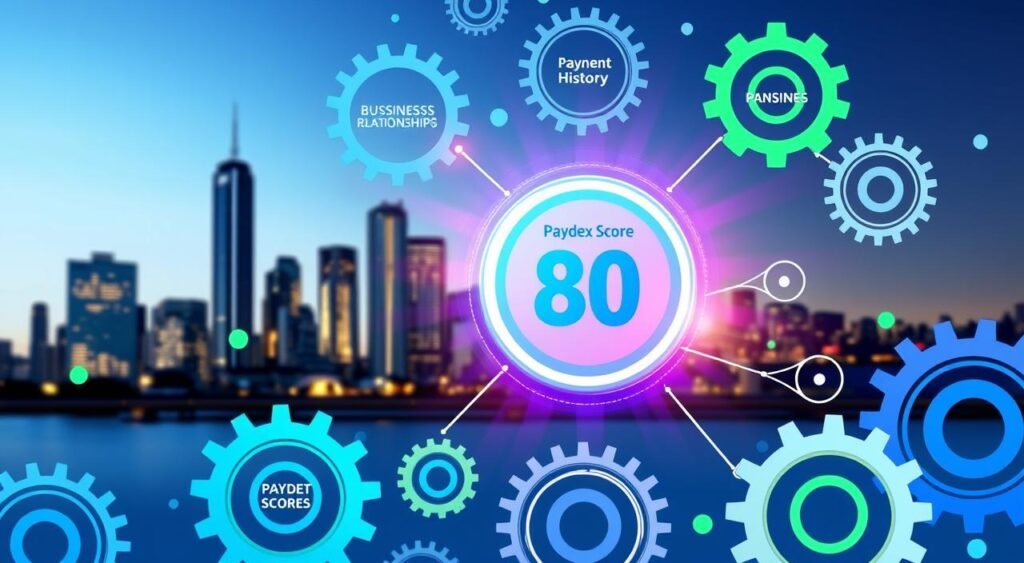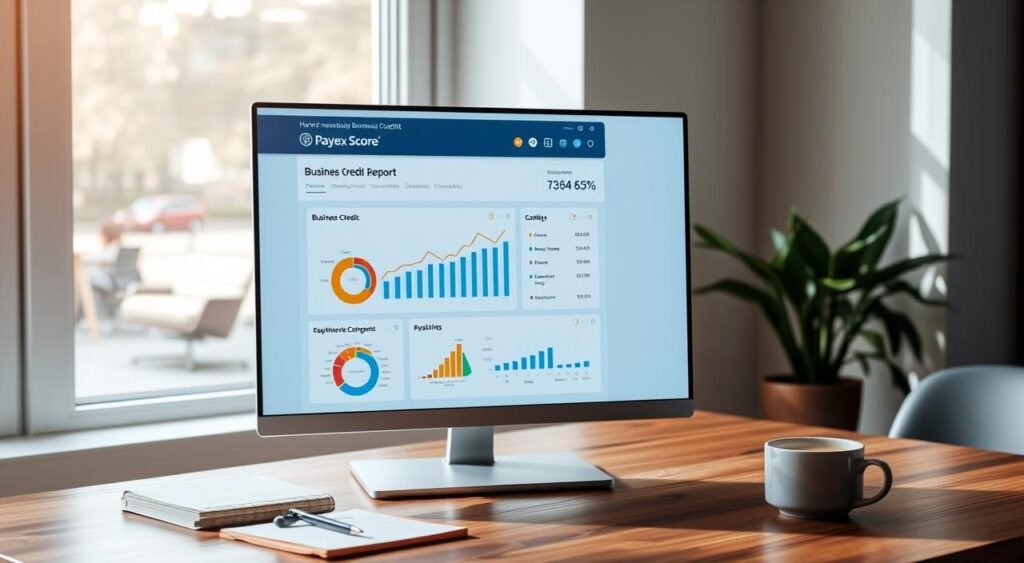Did you know a strong business credit score can help you get better loans and credit terms? Businesses with good credit can get lower interest rates and more trust from suppliers. This is key for growing and staying stable in a tough market1.
Understanding the basics of business credit is crucial. It helps your business stand out financially, paving the way for success2.
Lenders look at several things when deciding to lend, known as the “Six C’s” of credit: capacity, capital, collateral, conditions, creditworthiness, and character3. Each of these is important for showing your business is creditworthy and can get good deals.
Building business credit is more than just getting loans. It involves steps like keeping your business and personal finances separate. This not only boosts your credit score but also reduces risk in both areas2.
Key Takeaways
- Understanding business credit is essential for securing loans and favorable terms.
- The “Six C’s” of credit evaluated by lenders impact loan approval significantly.
- Maintaining a separate business credit history helps mitigate risks.
- Building business credit involves strategic steps for financial identity.
- A good business credit score opens doors to various financial advantages.
Understanding Business Credit
Business credit is like your company’s financial reputation. It’s built by showing you can pay back debts on time. Unlike personal credit, business credit lets your company have its own credit history. This is key to keeping your personal and business finances separate.
Business credit scores range from 1 to 100. Bureaus like Dun & Bradstreet, Equifax, and Experian use different factors to score your business. Your payment history is the most important factor, along with credit utilization, credit age, debt levels, industry risk, and company size456. Keeping your credit utilization under 30% is a good strategy for a high score.
Business credit scores are easier to get than personal credit scores. Instead of using your Social Security Number, your Employer Identification Number (EIN) is used4. A good business credit score can help you get better loans, lower insurance costs, and better deals with vendors56.
To improve your business credit, check your reports for errors and pay bills on time. You can get these reports for free or a fee from the major bureaus. By managing your business credit well, you can increase your financial opportunities.
Why Establishing Business Credit is Important
Having business credit is key to protecting your personal assets. It helps avoid risks when you own a business. By keeping your business credit separate, you can keep your business stable even if your personal finances are tough. In 2021, over a third of businesses looked for financing, mostly for basic needs like wages and rent7.
A good business credit score helps you get loans and better deals from suppliers. This is crucial for your business’s financial health. Credit cards, lines of credit, and loans all depend on your business’s creditworthiness8.
To build business credit, you need to take a few steps. First, set up a legal business, get an Employer Identification Number (EIN), and register with Dun & Bradstreet for a DUNS number7. Paying bills on time is essential for a good credit score. Also, check your business credit report often to catch any mistakes or fraud.
Keeping your credit low and paying off balances is important for a strong credit profile. Good business credit lets you buy more inventory and grow your business7. With strong credit, your business becomes more financially stable, setting it up for success in the long run.
Key Benefits of Good Business Credit
Having strong business credit brings many benefits. It opens up more financing options for your company. Businesses with good credit can get loans with lower interest rates, saving money on borrowing9.
Good business credit also lets you negotiate better payment terms with suppliers. This helps manage cash flow better by aligning payments with when you make money10. A solid credit score attracts more suppliers to offer credit, which is key for smooth operations.
Using business credit cards makes it easier to track and manage expenses. You get detailed statements that show how you’ve spent money9. This helps you keep an eye on spending and avoid unexpected costs. Plus, many business credit cards offer rewards like cash back or points, making your money go further9.
Showing you can use credit responsibly builds a strong business credit profile. This makes lenders trust you more, leading to better loan terms10. Good business credit opens doors to growth opportunities that can take your business to the next level.
| Benefit | Description |
|---|---|
| Access to Financing | Provides improved options for loans with better interest rates. |
| Payment Flexibility | Enables negotiation of favorable payment terms with suppliers. |
| Expense Management | Streamlines tracking and provides detailed expense categorization. |
| Rewards Programs | Offers cash back, points, or other rewards on business purchases. |
| Credibility | Enhances credibility with lenders and increases financing options. |
The Essential Business Credit Components
Building a strong business credit profile starts with several key elements. Keeping your business credit file detailed and accurate is crucial. Your business credit accounts show your credit history with vendors and lenders.
Timely debt payments greatly improve your credit score. A good credit history shows you’re financially responsible. This makes you more attractive to potential lenders11.
Understanding your financial ratios is important for lenders. They look at your income, cash flow, and assets to decide if you can repay loans11. A low debt-to-income ratio means you can handle more debt.
The ‘Four C’s of Credit’—Character, Capacity, Capital, and Collateral—give a full picture of your business’s health. Knowing these helps lenders see your business’s financial strength11. A solid capital base and collateral can open up more financing options11.
Good business credit can lead to better loan terms and help your business grow. Start by registering your business and getting an EIN. Regularly check your business credit accounts to stay on track12.

| Key Component | Description |
|---|---|
| Business Credit File | Document outlining your business’s credit history from agencies. |
| Business Credit Accounts | Reflect relationships with lenders and vendors based on payment history. |
| Credit Utilization | Maintaining low usage across credit accounts to enhance credit score. |
| Collateral | Assets that are pledged to secure loans, enhancing credibility. |
Keeping a close eye on these business credit components will prepare you for future financial opportunities.
Choosing the Right Business Structure
When starting a business, choosing the right business structure is key. It protects your interests and sets up a separate credit identity. The main types in the U.S. are sole proprietorships, partnerships, limited liability companies (LLCs), and corporations13.
Sole proprietorships are popular because they are cheap and easy. They have low fees and simple registration1413. But, they might not help you raise capital, like offering stock15. Partnerships share the workload but need a written agreement, which can be expensive1415.
Limited liability companies (LLCs) are a good middle ground. They let you have many shareholders and protect your personal assets1413. This makes your business look more credible and can improve your credit score. Corporations, however, are more complex. They need a board of directors and follow strict state laws, which can be costly15.
The structure you pick will affect your business’s money and how it runs. Choosing between a corporation, LLC, or partnership changes your taxes and daily tasks. Knowing these differences is crucial for success141513.
Obtaining an Employer Identification Number (EIN)
An Employer Identification Number (EIN) is a key federal tax identification number for your business. It helps keep your business separate from your personal life. This nine-digit number, given by the IRS, is needed for tasks like filing taxes or getting loans16. Even if you’re a sole proprietor, getting an EIN can make your business look more professional as it grows17.
Some businesses must get an EIN, like partnerships, corporations, and LLCs with more than one member. Also, if you hire people, pay excise taxes, or run a nonprofit, you’ll need one16. Most lenders and suppliers ask for this number to prove your business is real and separate16.
Getting an EIN is easy and free. You can apply online with the IRS and get your EIN right away17. Or, you can apply by mail or fax, but it takes longer. Fax takes about four business days, and mail can take up to five weeks16.
If your business changes or you go bankrupt, you need a new EIN. If you lose your EIN, you can get it back from old notices or by calling the IRS16. Having an EIN lets you do many business things and shows you’re serious about your business.
Opening a Business Bank Account
Starting a business bank account is key to setting up your business’s financial base. This account should only be used for business money, keeping it separate from personal funds. It makes accounting easier and helps track your business’s money flow.
To open a business bank account, you’ll need to provide important documents. These include your EIN, business setup papers, and business license. This step is vital for being open and trustworthy with banks18.
Having a business checking account can help improve your business credit score. A good credit score means you can get bigger loans and better deals. Paying bills on time is important for a strong credit history18.
Opening a business bank account also helps you build relationships with banks. These banks might offer more financial tools and help in the future. Keeping your business money accurate can also save you money on insurance and improve your credit score.
| Document Required | Details |
|---|---|
| EIN | Essential for business identification and tax purposes. |
| Business Entity Formation Documents | Indicates your business structure (LLC, Corporation, etc.). |
| Business License | Shows that your business is permitted to operate within your locality. |
| Personal Information | Includes personal details of the business owner(s) for verification. |
| Initial Opening Deposit | Minimum required amount to activate the account. |
It’s important to check your business credit reports from D&B, Equifax, and Experian regularly. This keeps you informed about your financial health and creditworthiness. Being proactive can help avoid problems and open up better financing options later18.
Establishing a Business Credit File
Creating a business credit file is key to showing lenders your business is reliable. By registering with credit reporting agencies like Experian, Equifax, and Dun & Bradstreet, you start building a strong credit profile. You need to keep your business and personal finances separate, get an Employer Identification Number (EIN), and a DUNS number from Dun & Bradstreet19.
It’s important to watch your business credit closely. Keeping your credit use under 30% is crucial for a good credit score19. Having a mix of loans, lines of credit, and credit cards also helps19. A long, positive credit history makes your business more creditworthy.

Managing your credit well is essential. Pay bills on time, use credit smartly, and check your credit reports often19. Building business credit is a long-term effort that needs commitment and effort. Business credit cards, for example, help track spending and build credit history19.
To get a PAYDEX® score, your business needs at least four trade references, Dun & Bradstreet says20. Experian requires one tradeline and one demographic event for a business credit report and score20. FICO’s Small Business Scoring Service (SBSS) looks at both business and personal credit, which can lead to a score even without business credit if personal credit meets criteria20.
Business Credit Management Strategies
Effective business credit management is key to your company’s financial health. Paying bills on time is crucial for a good credit score. Using credit scoring systems helps set the right credit limits and terms for clients21.
This approach boosts efficiency and helps spot potential risks in your credit portfolio.
It’s vital to understand and adapt to economic changes. Markets vary in how they handle credit, with emerging markets often relying on alternative financing22. Knowing these differences helps tailor your credit policies to fit the market, leading to better management.
Checking credit reports regularly for errors and documenting credit decisions is essential. This builds trust with customers. New customers are riskier, so assessing their creditworthiness remotely is necessary22. Regularly reviewing existing customers’ credit terms helps adjust to their changing financial situations.
Cultural differences also shape your credit management strategies. Some cultures are cautious with credit, while others see it as a growth tool22. Grasping these cultural differences is crucial for effective global credit strategies.
Keeping a low credit utilization ratio is also important. It helps manage cash flow and reduces the risk of overdue accounts21. Diversifying your client base can also reduce the impact of defaults, making your business more stable.
Investing in your team’s education on credit policies and risk assessment is vital. Well-trained staff can make informed decisions and handle credit tasks effectively21. Using technology improves operations and keeps your business competitive globally22.
Throughout your credit management journey, staying on top of regulations is crucial. Strict rules may mean more cautious policies, while loose oversight can increase risk22. Adapting to these regulations helps mitigate risks and promotes sustainable growth.
Monitoring Your Business Credit Report
Keeping an eye on your business credit report is key to a healthy financial state. Your business credit score, from 0 to 100, is crucial for credit score management. Knowing how changes affect your score helps in making better choices and planning ahead.
Three major credit bureaus track your small business credit: Dun & Bradstreet, Experian Business, and Equifax Business23. Each offers monitoring services, with prices like $39.95 for Experian’s CreditScore Report or $39 monthly for Dun & Bradstreet’s CreditMonitor24. Some banks give free access to scores, helping you stay updated without extra costs24.
By regularly monitoring your business credit report, you can spot fraud and fix wrong entries fast. Regular checks help you find issues like late payments and high debt, key for managing risks and growth23. Knowing your score helps you get better deals from suppliers and vendors, improving your business.
Also, good credit makes it easier to get credit, which is vital for recovery from global economic impacts23. Regularly reviewing your credit report keeps your business reputation and finances strong.

| Service | Cost | Provider |
|---|---|---|
| Experian CreditScore Report | $39.95 | Experian |
| Experian Detailed Credit Report | $49.95 | Experian |
| Dun & Bradstreet CreditMonitor | $39/month | Dun & Bradstreet |
| Dun & Bradstreet CreditSignal | Free for 14 days | Dun & Bradstreet |
| Annual Cost of Experian’s Business Credit Advantage | $189/year | Experian |
| Equifax Business Credit Report | Free | Equifax |
Knowing your credit health helps you make smart decisions that can grow your business.
Conclusion
Setting up and handling your business credit is key to financial success. Knowing about payment history and credit use helps you make smart choices in the world of finance25. Today, thanks to tech, managing credit risks is easier and faster, saving time and money26.
Good credit management means your team works better and customers join faster. This helps your business grow and succeed26.
Also, a good business credit score means better loan rates and more funding chances, like SBA loans and venture capital25. Keep an eye on your credit and fix any problems quickly. This keeps your finances strong. By doing this, you make your business stronger and set it up for success in the long run.
FAQ
What are the main components of business credit?
How do I start establishing business credit?
Why is it essential to maintain separate business credit from personal credit?
What factors affect my business credit scores?
How can I improve my business’s creditworthiness?
What is the significance of an EIN for business credit?
Where can I check my business credit report?
What benefits come with having good business credit?
How do I monitor my business credit health?
What is the role of vendors in building business credit?
Source Links
- How to Build Business Credit – https://www.yendo.com/blog/business-credit
- How to Build Business Credit for a Small Business – https://www.wolterskluwer.com/en/expert-insights/how-to-build-business-credit-for-a-small-business
- The 6 C’s of Business Credit – https://www.score.org/resource/article/6-cs-business-credit-0
- What Is A Business Credit Score And How Does It Work? | Bankrate – https://www.bankrate.com/loans/small-business/building-better-business-credit-score/
- A Comprehensive Guide to Establishing Business Credit – https://www.investopedia.com/establish-business-credit-7972523
- Understanding Business Credit Scores | Capital One – https://www.capitalone.com/learn-grow/business-resources/business-credit-scores/
- Importance of Building Credit for Your Business – https://www.nscbank.com/small-business/resources/financial-education/2023/02/importance-of-building-credit-for-your-business.html
- What is Business Credit and How do I Build It? – https://business.bankofamerica.com/resources/what-is-business-credit-and-how-do-i-build-it.html
- 10 Benefits of a Business Credit Card That You Need to Know – https://www.highradius.com/resources/Blog/benefits-of-a-business-credit-card/
- Benefits of a Good Business Credit Score | Bluevine – https://www.bluevine.com/blog/benefits-of-building-a-good-credit-score
- The Four C’s of Credit: Understanding Key Components for Business Financing – https://www.biz2credit.com/blog/the-four-cs-credit-understanding-key-components-business-financing/
- Personal vs. Business Credit Score – https://resources.liveoakbank.com/blog/personal-vs.-business-credit-score
- Business Structure – https://corporatefinanceinstitute.com/resources/management/business-structure/
- Six major types of business structures – https://www.wolterskluwer.com/en/expert-insights/options-for-business-structure-types
- Guide to Choosing a Legal Structure for Your Business – https://www.businessnewsdaily.com/8163-choose-legal-business-structure.html
- Employer Identification Number (EIN): What It Is, How to Apply – NerdWallet – https://www.nerdwallet.com/article/small-business/how-to-get-an-ein-employer-identification-number
- 8 reasons why you need an EIN for your business and how to apply for one – https://www.cnbc.com/select/how-to-apply-for-an-ein/
- How to Establish Business Credit – https://www.score.org/resource/article/how-establish-business-credit
- Opening a Business Credit File: A Step-by-Step Guide | OnDeck – https://www.ondeck.com/resources/create-small-business-credit-file
- How to Open a Business Credit File – Credit Strong – https://www.creditstrong.com/open-business-credit-file/
- What is Business Credit Management: A Complete Guide – ERP Transformation Specialists | Oracle Partner | oAppsNet – https://www.oappsnet.com/2024/07/what-is-business-credit-management-a-complete-guide/
- B2B Credit Management – https://www.trevipay.com/resource-center/blog/b2b-credit-management/
- The Importance of Business Credit Monitoring: Proactive Strategies for Success | Bluevine – https://www.bluevine.com/blog/importance-business-credit-monitoring
- Business Credit Reports: What They Are, How to Check Yours – NerdWallet – https://www.nerdwallet.com/article/small-business/business-credit-report
- Business Credit and Financing | Definitions, Types, & Strategies – https://www.financestrategists.com/mortgage-broker/line-of-credit/business-credit-and-financing/
- 5 Essential Credit Management Workflows – Conclusion – https://www.highradius.com/resources/ebooks/conclusion-4/

